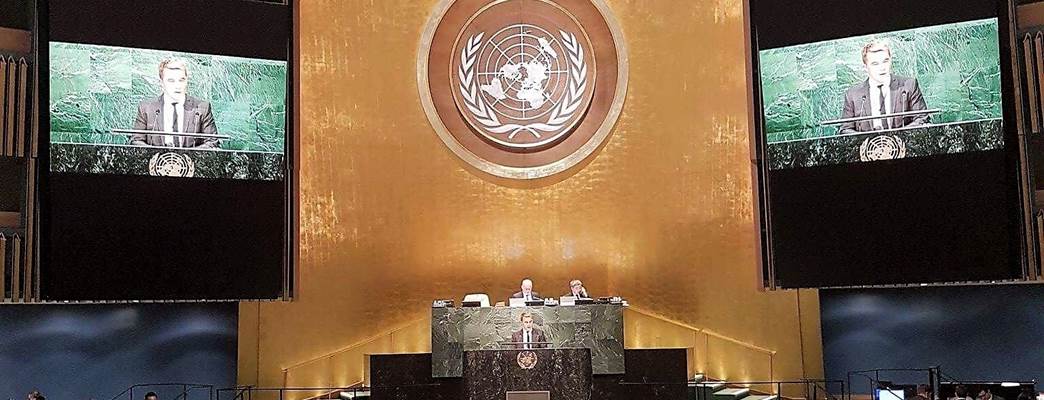Mr. President,
Norway had the honour to coordinate the informal consultations on draft resolution A/71/L.24, on sustainable fisheries, and is pleased to introduce that text on behalf of all its sponsors. This year's draft resolution is a further step forward in the conservation and management of fisheries, which are an essential resource for sustainable development in much of the world.
My delegation is also pleased to join many others in co-sponsoring draft resolution A/71/L.26, entitled 'Oceans and the law of the sea', to be introduced by Thembile Joyini from South Africa. We compliment Mr. Joyini on his careful stewardship of that draft.
The fisheries draft resolution addresses important issues, such as achieving sustainable fisheries, combating illegal, unreported and unregulated fishing and addressing fishing overcapacity and improving subregional and regional cooperation to achieve sustainable fisheries management.
It also addresses issues undertaken in other UN forums such as the work shop on bottom fisheries in August and the resumed Review Conference in May on the United Nations Fish Stocks Agreement. Key outcomes from other forums, both regional and global, are also considered in the draft resolution.
This year's consultations considered the impacts of bottom fishing on vulnerable marine ecosystems and the long-term sustainability of deep sea fish stocks, mandated in paragraph 162 of resolution 69/109. The review was undertaken with a view to ensuring effective implementation of the measures therein and to make further recommendations, where necessary.
Delegations agreed on new provisions to enhance the regulations of bottom fishing activities. Notably, the draft further highlights the importance of adequate conservation and management measures to prevent significant adverse impacts from bottom fishing on vulnerable marine ecosystems. The draft text articulates urgent actions that States and regional fisheries management organizations have to take in this regard.
Furthermore, this year's draft resolution encourages necessary measures where appropriate, consistent with international law in order to prevent and deter vessels without nationality from engaging in or supporting illegal, unreported and unregulated fishing. Such vessels operate on the high seas without governance and oversight.
This reflects the international community's ongoing concern over the negative impact of IUU fishing on the sustainable management of fish stocks and its recognition that there is a shared responsibility in addressing the issue. The draft resolution also emphasizes the central importance of providing a safe working environment for those engaged both in fishing activities and in monitoring compliance.
The draft resolution also urges States parties to the United Nations Fish Stocks Agreement to take into account the special requirements of developing States, including small island developing States, when cooperating to establish conservation and management measures for straddling fish stocks and highly migratory fish stocks.
Mr. President,
Norway is of the firm view that the United Nations Convention on the Law of the Sea provides the universal and unified framework for the peaceful, responsible and predictable management of the oceans and seas. All activities in the oceans and seas must be carried out within this framework. In ever-changing conditions, the Convention provides clarity with regard to both the obligations and rights of States.
Clear maritime boundaries are essential for identifying which State has rights and obligations in which areas under the Law of the Sea. The establishment of the outer limits of the continental shelf beyond 200 nautical miles is of key importance in this regard. The Commission on the Limits of the Continental Shelf plays a significant role in this work.
This year, Norway is pleased to be able to make a contribution to the voluntary trust fund, for the purpose of defraying the cost of participation of the members of the Commission from developing States in the meetings of the Commission. We encourage other States to consider contributing to this fund.
Mr. President,
As coordinator, I would like to personally thank Director Gabriele Goettsche-Wanli and the staff of the Division for Ocean Affairs and the Law of the Sea for their expertise, professionalism and invaluable support on both draft resolutions. And we again thank Thembile Joyini from South Africa for his expert coordination of the draft resolution on Oceans and the law of the sea. Let me also thank Alice Revell from New Zealand for her work in successfully coordinating the fisheries resolution over the past four years.
Finally, let me conclude by conveying Norway's appreciation for the hard work and cooperation of delegations in crafting both draft resolutions. It is our hope that this constructive and collaborative engagement will be maintained as we continue to address the numerous and complex issues that face our oceans and fisheries.
Thank you.
